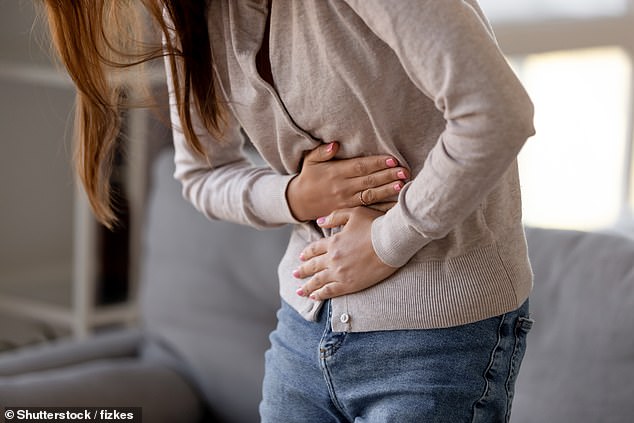You’re getting ready to give a big presentation at work, when suddenly nature calls.
Your nervous trips to the bathroom can be explained by the invisible thread that connects your head to your intestines, said Arizona-based Dr. Nicole Cain.
Doctors have recently begun to examine the complex relationship between the brain and the digestive system.
“The gut and the brain communicate in a bidirectional axis and that’s called the gut brain microbiome, or gut brain microbial axis,” Dr Cain told DailyMail.com.
“And we’ve discovered that gut viruses actually talk a lot more than the brain.”
The stomach sensations you may feel when you are nervous are evidence of the gut-brain axis.
Her advice is to practice slow, deep breathing when you feel anxiety rising. Avoiding foods rich in fiber and caffeine can also limit the effects.
Dr. Cain began focusing on the gut-brain connection in medical school after seeing a patient with a crippling case of Crohn’s disease and anxiety.
The patient spent days lying on the bathroom floor, with joint pain and chronic diarrhea, and no treatment was working.
Over time, targeted treatment helped her control her gastrointestinal symptoms, and at the same time, her anxiety seemed to miraculously disappear.
This, Dr. Cain said, made her think: “There is something profound about this connection.”
Before a first date, an important exam, or a public speech, our brain can begin to emit signals of stress and anxiety.
These tell the body to release chemicals such as cortisol, serotonin, and adrenaline.
These messengers travel throughout the body, speeding up heart rate and blood pressure and binding to receptors in the gut.
This causes a “tightening or churning” sensation, which stimulates the intestines and creates waves of contractions that tell you to head for the porcelain throne.
You may find that when the anxiety stops, you won’t have to go anymore.
Other times, your body actually creates something in this storm and only releases it when you are able to relax and your body is able to release the stool.
‘Immediately after the adrenaline rush is when everything can start hitting you all at once,’ gastroenterologist Dr. Christine Lee told the Cleveland Clinic.
On the other hand, depression can also affect the intestine.
For some people who suffer from depression, the condition is caused by an imbalance in chemicals called neurotransmitters.
Serotonin is a neurotransmitter that helps control sleep, sex drive, mood, and digestion. Between 90 and 95 percent is made in the digestive system, depending on the University of Pennsylvania.

Dr. Cain became attuned to the gut-brain axis after a patient with a severe case of Crohn’s disease and anxiety had apparently been cured simultaneously
This has led researchers to theorize that for some patients with depression, the problem could stem from intestinal dysfunction, as their digestive system may simply not be making enough serotonin to keep the brain functioning smoothly.
Additionally, serotonin itself produces changes within the intestine.
‘There are more serotonin receptors in the intestinal tract than in the brain. Because of this, serotonin plays as important a role in the intestinal tract as it does in the brain,” said Dr. Lee.
In the gastrointestinal tract, serotonin helps control how quickly food moves through the intestines, the amount of fluid that is produced to help break down and move food, and sensitivity to sensations such as fullness and satiety. intestinal pain.
Research has found strange and similar links between gastrointestinal health and depression.
Implanting stool samples from people with depression into bacteria-free rats led them to develop symptoms of depression, such as disinterest in their normal activities, a 2016 study from University College Cork found.
A great study of 2023 who reviewed fecal samples from more than 1,000 people found that all people with depression had low levels of a bacteria called Eubacterium ventriosum, compared to people without depression.
This suggested that a lack of this bacteria could be contributing to the condition.
One final way the connection between the gut and the brain is shown is through the vagus nerve, Dr. Cain said.

The hormones and neurotransmitters released during a stress response have many receptors in the gastrointestinal tract.
The vagus nerve is one of a set of 12 large nerves that extend directly from the brain to the body. It controls a lot of functions that you can’t control by sheer will, including digestion, heart rate, and the immune system.
One of its most important functions is to transition your body from stress to decompression. After leaving a situation where you are stressed, your vagus nerve activates, stabilizing your heart rate, reducing anxiety and boosting your immune system.
This also puts your gut back to rest, working on processing food and delivering energy at a leisurely speed.
Some naturopaths, like Dr. Cain, say this system can be “hacked” for your benefit. If you notice that you become anxious or stressed in a situation that doesn’t require it, you can try activating your vagus nerve, resetting your body and gut.
Deep breathing exercises, mindfulness, cold exposure and meditation can “activate” the vagus nerve again, calming it, Dr. Cain said.
Whether through anxiety, depression, or simple vagus nerve simulation, each of us has to deal with the strange interplay between the gut and the brain, Dr. Cain said, “instead of feeling shame and shame.” Therefore, it is understanding that this is your body giving your information.
“We are, in general, products of our intestine.”

